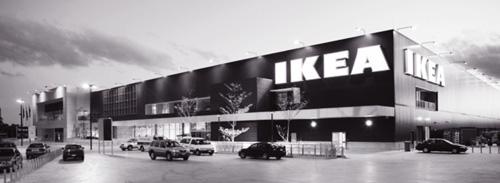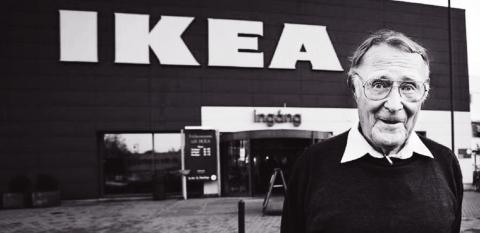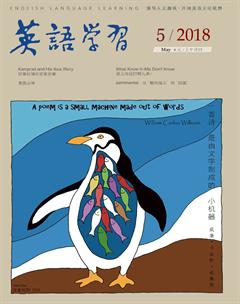坎普拉德的宜家故事
By Robert D.McFadden
Ingvar Kamprad, who has died aged 91, is not a household name, but the company that made him a billionaire most certainly is. Ikea, the Swedish flat-pack furniture group with 412 stores in 49 countries, bears the name that Kamprad registered in 1943, when, aged 17, he needed to set up a company in order to buy a job-lot1 of pencils. It stands for Ingvar Kamprad and Elmtaryd, Agunnaryd, after the farm and village in the southern Swedish region of Sm?land where he grew up.
Nearly 75 years on, sales of self-assembly pieces such as a bookshelf called Billy and basics such as the sofa called Klippan, are thought to have amassed him a fortune of $54bn. In 2006, he was placed fourth in Forbes annual list of the worlds wealthiest billionaires. His affairs are complicated, however, involving a family foundation based in Liechtenstein, and he claimed his personal wealth to be far less.
Growing from a small local furniture business in the 1940s to the global brand it is today, Ikea has done more to change the look of homes in many parts of the world than any other retailer. While some believe that its cheap-enough-to-be-disposable goods are an unnecessary evil in a society that should be building sustainability into consumer products, for others Ikea represents the fulfilment of the modernist dream that preached the message of calm, clean, affordable design for all.

With the exception of perhaps McDonalds, Ikea has uniquely transcended barriers of class, culture and geography in the late 20th and early 21st century, flying in the face of2 received retail wisdom by selling the same products with unpronounceable Swedish names all around the world. The catalogue once had a print run of 150m copies, and some statistics claimed that more than 10% of the population of Europe had been conceived3 in an Ikea bed. In 2016, the company celebrated its own achievements by opening an Ikea museum in ?lmhult, on the site of the first store, opened in 1958.
Kamprads journey to world furniture domination was punctuated by problems. He liked to say, self-deprecatingly, that “no one has had as many fiascos as I have”.4 These included boycotts, accusations of nazism, tax avoidance and plagiarism5, and alcoholism. Yet those who worked closely with him have suggested he found it painful if things seemed to be going too well—that the struggle and the solution were part of the same continuum6. You can perhaps take the farmers son out of Sm?land, but in Kamprads case you cant take Sm?land—a harsh, agricultural and punishing region—out of the boy.
Born to Feodor Kamprad, a German immigrant, and Berta (nee7 Nilsson), on the farm, Elmtaryd, Ingvar kicked off his first business venture—selling matches, bought in bulk in Stockholm, to the villagers—at the age of five. By the time he was 11, he was making enough money from selling seeds to buy himself a racing bike and a typewriter. Cycling remained a passion and, well into old age, the famously thrifty8 billionaire enjoyed nothing more than a Swedish cycling holiday with his friend Erling Persson, the founder of Hennes & Mauritz(H&M;).
In 1943, the first incarnation of Ikea appeared, a mail-order business selling pencils, postcards, and other merchandise.9 Many farmers in Sm?land made furniture as a sideline, and Kamprad soon added these products to his stock. By 1951 he had made his first million krona10.
Sweden was undergoing dramatic and rapid modernisation. During the 1950s, 50,000 farms closed, and between 1946 and 1966 1m flats were built to house those leaving the land. In 1952, the first flat-pack item, a table called Max, was produced to service those moves. The idea was that if the customer did some of the work, the customer paid less of the price. In 1971, when Ikeas flagship store at Kungens Kurva in Stockholm reopened after being gutted11 by fire, self-service was introduced. The idea remains strong in Ikeas culture that the customers blood, sweat and tears is repaid in savings—something of a Lutheran12 consumer model.

Kamprads tendency to undercut13 his rivals did not go down so well. In the 50s and 60s producers and retailers boycotted the company under pressure from the National Association of Furniture Dealers, and he was banned from furniture fairs. Eventually he took his production to Poland (and later all over the world), where costs were low, and it was there, where most minutes of the day were washed down with vodka, that his problem with alcohol began. Kamprad dealt with his excessive drinking by drying out14 for three weeks at a time once a year. In 2014 he claimed his drinking was under control.
Accusations of plagiarism dogged the company throughout Kamprads directorship, which finished in 1986, after the company switched to a franchising model, and beyond.15 Then in 1994, he was faced with charges in the press about his Nazi past. He sent a handwritten fax to all his staff headed “Could not stop the tears”, and recounting his shame. He denied any direct memories of being a fully paid-up Nazi party member, though it has been said Nazi sympathies were encouraged by his German grandmother, Franziska. But he could never escape from the reality that he had been very close to Per Engdahl, the Swedish fascist leader, for many years. In 2001 the company expanded into Israel without the subject being raised.
Kamprads politics pervade the entire culture of Ikea, which is a sort of moral humanism sold through furniture. In 2011, he set up the Kamprad Family Foundation, whose mission is “to support, stimulate and reward education and scientific research in a way that supports entrepreneurship, the environment, competence, health and social progress”.
In 1973, in order, he said, to avoid “tax consequences”, Kamprad took his family off to Denmark, and then four years later to Switzerland. He returned to Sweden in 2014, three years after his second wife Margarethas death. In December 2017, the EU launched an investigation into the tax affairs of Ikea after claims that the firm had saved around 1bn in tax through its complex corporate structure.
In 2000, he had, in the manner of the best fairy stories, given each of his three sons from his second marriage, Peter, Jonas and Matthias, a piece of his empire to run. In 2013 he stepped down as chairman of the board and handed over to Matthias.
Kamprads modesty was legendary, driving only a?koda and a 1993 Volvo, and trawling16 flea markets for clothes. “He was so unassuming17, youd never guess at his wealth,” said an acquaintance who visited him at home in Switzerland. “The whole family, they are just not interested. There are no fancy cars or watches even. The company is the passion. And yes, he was a friendly person.”
Perhaps in another life Kamprad would have made a good preacher. There was something evangelical18 about his zeal, and religious about his method. In 1976, he wrote “A Furniture Dealers Testament”, published as an appendix to Bertil Torekulls Leading by Design: The Ikea Story, in 1999. It was filled with homilies19 such as “No method is more effective than the good example”, and headings such as “the Ikea spirit is a strong and living reality”. Another favourite line was that: “Only those who are asleep make no mistake.” At least Kamprad can now rest assured that his days of causing fiascos are over.
享年91歲的英格瓦·坎普拉德并不算是家喻户晓,但让他成为亿万富翁的公司绝对是。作为一家来自瑞典的平板包装家具集团,宜家在49个国家拥有412家分店。坎普拉德于1943年注册了宜家这个名字,时年17岁的他需要成立一家公司以便购入一批铅笔。宜家(IKEA)代表Ingvar Kamprad和Elmtaryd, Agunnaryd,后者指的是瑞典南部地区斯莫兰的农场和村庄,他在那里长大。
近75年来,通过销售如名为毕利(Billy)的书架等自行组装的产品和名为克利帕(Klippan)的沙发等基本款家具,他积累了540亿美元的财富。2006年,他在福布斯年度全球富豪榜中名列第四。然而,他的情况很复杂,因为涉及列支敦士登的一个家族基金会,他宣称自己的个人财富要少得多。
从上世纪40年代的一家本土小型家具企业成长为今天的全球品牌,宜家比其他零售商作出了更多的努力来改变世界各地住宅的面貌。虽然有些人认为其价格低廉从而可以用完就扔的商品在一个应该将可持续发展融入消费品的社会中是一种不必要的罪恶,但对于其他人而言,宜家代表了现代主义梦想的实现,这一梦想宣扬为所有人提供平静、清洁、实惠的设计。
除了麦当劳以外,大概只有宜家在20世纪末和21世纪初跨越了阶级、文化和地理的重重障碍,通过在世界各地销售相同的有着难以发音的瑞典名的产品,将广为接受的零售智慧完全颠覆。宜家产品目录曾一度达到一亿五千万册的印量,而且有统计数据表明,有超过10%的欧洲人口是在宜家的床上被怀上的。2016年,为了赞颂自身的成就,公司在1958年开放的位于瑞典艾尔姆胡尔特的第一家门店原址上开设了宜家博物馆。
坎普拉德在通往世界家具领导者的征途上麻烦不断。他喜欢自嘲说,“没有人比我遭受过更多的打击”。这些打击包括被抵制、被指控纳粹主义、避税、剽窃以及酗酒。然而,那些曾与他密切合作的人表示,如果事情似乎进展得过于顺利,他反而会感到痛苦——必须先奋力拼搏才能最终解决问题。你也许可以把这位农民的儿子从斯莫兰带走,但就坎普拉德而言,你无法把斯莫兰——一个环境严苛、处境艰难的农业地区——从这个男孩里带走。
父亲为德国移民费多尔·坎普拉德,母亲为贝尔塔(婚前原姓尼尔森),英格瓦出生于埃尔姆塔尔德的农场。五岁时他便做起了第一笔生意:从斯德哥尔摩大量批发火柴卖给村民。11岁时,他通过卖种子赚到了给自己买竞速自行车和打字机的钱。骑自行车一直是他的热情所在,到年迈之时依然如此,这位以节俭出名的亿万富翁最享受的事情莫过于与他的朋友——海恩斯莫里斯(H&M;)的创始人埃尔林·佩尔森——一起享受瑞典的自行车度假。
1943年,宜家的雏形出现了,那是一家通过邮购出售铅笔、明信片和其他商品的企业。斯莫兰有许多农民把制作家具当成副业,而坎普拉德很快就把这些家具产品添加到他的商品存货中。1951年,他赚到了他人生的第一个百万克朗。
瑞典当时正经历着剧烈而迅速的现代化。上世纪50年代,五万间农场被关闭,而1946年至1966年间,一百万所公寓拔地而起,供离开田地的那些人居住。1952年,宜家生产了第一个平板包装产品——一种名为麦克斯(Max)的桌子——来服务这些移居城市的农民。当时的想法就是,如果客户自己也出些力,那么他们就能少付些钱。1971年,当位于斯德哥尔摩克宫根斯科尔瓦的旗舰店遭受火灾后重新营业时,宜家引入了自助服务。在宜家的文化中,这个想法经久不衰:顾客的鲜血、汗水和眼泪以省钱的形式得到偿还,这就像是某种路德宗的消费模式。
坎普拉德的价格战打得并不顺利。上世纪五六十年代,生产商和零售商在全国家具经销商协会的压力下抵制宜家,而且坎普拉德被禁止参加家具展览会。最终,他转移阵地到波兰(后来到世界各地)生产产品。波兰的成本很低,也正是在那里,他出现了酗酒问题:一天当中大部分时间他都在喝伏特加。坎普拉德通过每年一次戒酒三周来应对他的过度饮酒问题。2014年他宣称他的酗酒问题已经得到控制。
剽窃的指责一直如影随形,贯穿坎普拉德领导宜家的整个时期。在宜家转为特许经营模式之后,他于1986年起不再担任领导职务。1994年,媒体指控他有着纳粹的过去。他向所有的工作人员发送了一封题为“泪流不止”的手写传真,讲述他的耻辱。他否认自己是正式的纳粹党员,尽管据说他对纳粹的亲善倾向是因为他的德国祖母弗兰齐斯卡的鼓励。但他永远无法摆脱这样一个事实:他与瑞典法西斯领导人皮尔·恩达尔多年来一直关系密切。2001年,宜家的生意扩展到以色列,但没有人提起这个话题。
坎普拉德的政治态度渗透了整个宜家文化。宜家文化是某种通过家具推广的道德人文主义。2011年,他成立了坎普拉德家族基金会,其宗旨是“支持、鼓舞和奖励教育与科学研究,从而支持创业、环境、能力、健康和社会进步”。
1973年,他表示,为了避免“税收方面的后果”,坎普拉德举家移居丹麦,四年后又移居瑞士。2014年,在他第二任妻子玛格丽莎去世三年后,坎普拉德回到了瑞典。2017年12月,欧盟针对宜家的税务问题展开了调查,因为之前有人宣称宜家通过其复杂的公司架构少缴了约10亿欧元的税费。
2000年,如同最美好的童话故事一般,他给他第二次婚姻生下的三个儿子—— 彼得、乔纳斯和马蒂亚斯—— 一人分了一块他的商业帝国去运营。2013年,他辞去董事会主席的职务并由马蒂亚斯接任。
坎普拉德是出了名地谦逊低调。他开的车只有一辆斯柯达和一辆1993年的沃尔沃;他穿的衣服都是在跳蚤市场淘来的。“他太低调了,你绝对猜不到他多么富有,”一位曾前往他位于瑞士的家中拜访过他的熟人说道。“整个家庭,他们对炫富不感兴趣。他们甚至没有奢华的汽车或手表。公司才是激情所在。而且是的,他是个非常友善的人。”
也许在另一个人生里,坎普拉德会成为一名优秀的传道者。他的热忱如布道般狂热;他的方法有着宗教的成分。1976年,他写了《一个家具商的信仰》,作为附录发表在1999年伯迪·托尔卡所著的《以设计领先:宜家的故事》里。文章中充满了诸如“没有比好的榜样更有效的方法”之类的训诫,以及如“宜家精神是一个强大且活生生的现实”之类的标题。另一句他最喜欢的话就是:“只有睡着的人才不会犯错。”至少现在坎普拉德可以放心,他不会再铸下大错了。
1. job-lot: 论堆的廉价杂品。
2. fly in the face of: 悍然不顾,公然违抗。
3. conceive: 怀孕。
4. deprecatingly: 不赞同地,批评地;fiasco:惨败。
5. plagiarism: 抄袭,剽窃。
6. continuum:(不可分割的)统一体,连续体。
7. nee: 娘家姓……的(用在已婚女子的姓后)。
8. thrifty: 節俭的。
9. incarnation: 化身,体现;merchandise:
商品,货物。
10. Krona: 克朗(瑞典、丹麦、挪威等国的货币单位)。
11. gut: v. 从内部毁坏。
12. Lutheran: 路德宗的。路德宗(Lutheranism)是以马丁·路德的宗教思想为依据的各教会团体之统称,其教义核心为“因信称义”(人只有具备了纯正信仰才能成为真正的基督徒),它是德意志宗教改革运动的产物,由马丁·路德于1529年创立于德国,其建立标志着基督新教的诞生。
13. undercut: 以低于对手的价格竞争。
14. dry out: 戒酒。
15. dog: v. 困扰,跟踪;franchise: 特许经营;and beyond: 及其之后。
16. trawl: 搜罗。
17. unassuming: 不装腔作势的,不招摇的。
18. evangelical: / 如福音传教士般的,狂热的。
19. homily: 说教,训诫。

